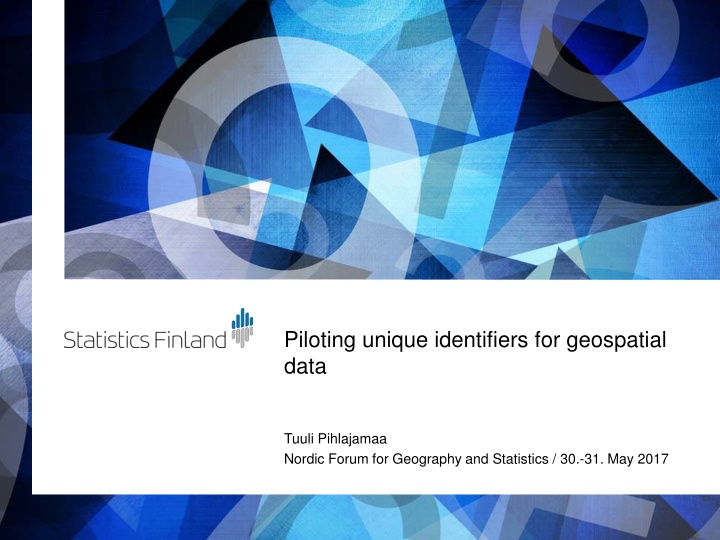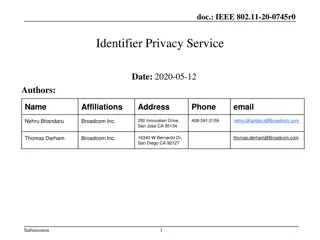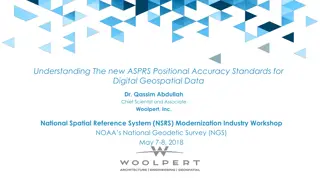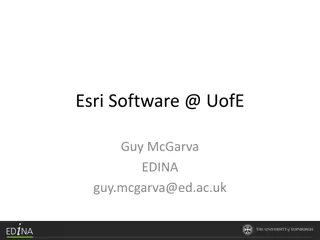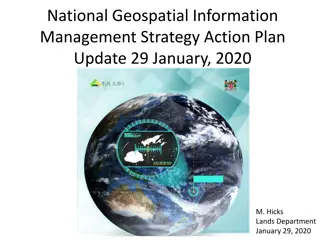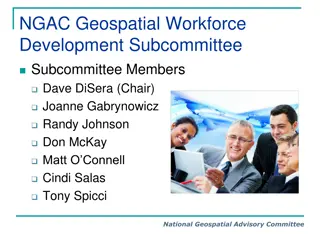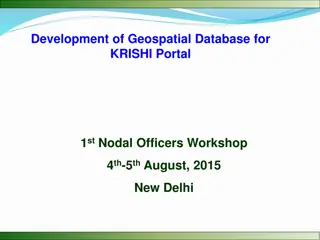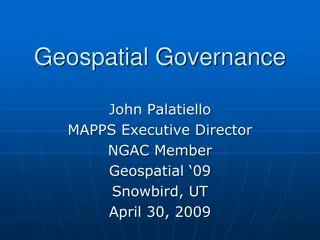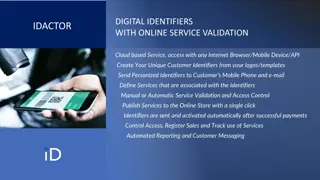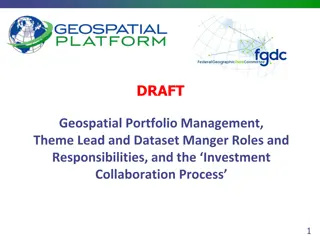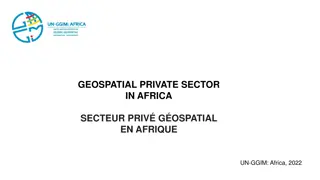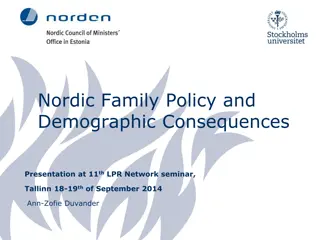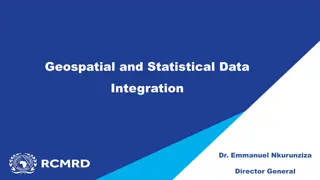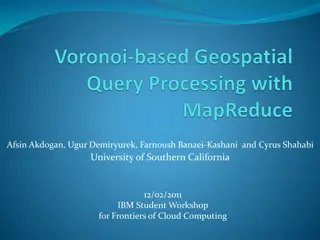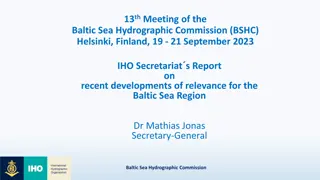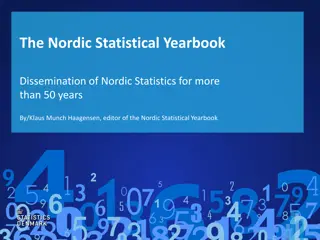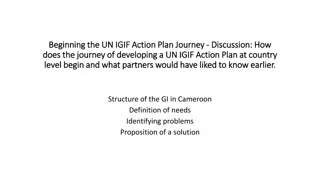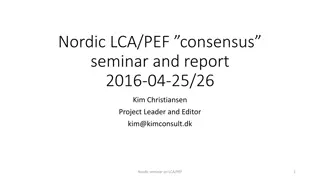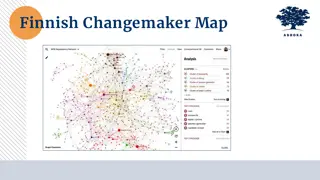Piloting Unique Identifiers for Geospatial Data - Nordic Forum Presentation
Presentation at the Nordic Forum for Geography and Statistics on piloting unique identifiers for geospatial data by Tuuli Pihlajamaa. The agenda included terms used, background for the pilot, aims, results, and future plans. Detailed discussions on terms like URI, RDF, JHS 193, INSPIRE guidelines, and Statistics Finland's services were covered.
Uploaded on Oct 09, 2024 | 3 Views
Download Presentation

Please find below an Image/Link to download the presentation.
The content on the website is provided AS IS for your information and personal use only. It may not be sold, licensed, or shared on other websites without obtaining consent from the author.If you encounter any issues during the download, it is possible that the publisher has removed the file from their server.
You are allowed to download the files provided on this website for personal or commercial use, subject to the condition that they are used lawfully. All files are the property of their respective owners.
The content on the website is provided AS IS for your information and personal use only. It may not be sold, licensed, or shared on other websites without obtaining consent from the author.
E N D
Presentation Transcript
Piloting unique identifiers for geospatial data Tuuli Pihlajamaa Nordic Forum for Geography and Statistics / 30.-31. May 2017
Agenda of the presentation 1. Terms 2. Background for the pilot 3. Aims of the pilot 4. Results and notes 5. Future plans Demos 2 30 May 2017 Tuuli Pihlajamaa
1. Terms used in the presentation URI s: A Uniform Resource Identifier (URI) is a compact sequence of characters that identifies an abstract or physical resource. (https://tools.ietf.org/html/rfc3986) RDF:Resource Description Framework, RDF is a standard model for data interchange on the Web. (https://www.w3.org/RDF/) One of the key ingredients of Linked Data, and provides a generic graph-based data model for describing things, including their relationships with other things. (http://linkeddata.org/faq) JHS 193: JHS 193 Unique identifiers of the geographic information , a national recommendation for Public Administration in Finland 3 30 May 2017 Tuuli Pihlajamaa
2. Background for the pilot INSPIRE gives recommendations of the unique identifiers of spatial objects INSPIRE Generic Conceptual Model Guidelines for the encoding of spatial data National centralized resolution service in Finland URI s for real-world phenomena /id/, spatial objects /so/, definitions /def/ and documentation /doc/ Data provider determine the local-id for so s Requests to URI s -> data provider s own URI service -> returns the documentation related, in requested format 4 30 May 2017 Tuuli Pihlajamaa
2. Background for the pilot - Statistics Finland s INSPIRE services and data View services (WMS) and download services (WFS) are available since May 2013 (http://www.stat.fi/tup/rajapintapalvelut/inspire_aineistot_en.html) Annex III Statistical Units: Municipality-based statistical units Grid net for statistics 1 km x 1 km Population Distribution: Population by municipality-based units Population grid data 1 km x 1 km Production and industrial facilities: Production and industrial facilities Utility and governmental services: Educational institutions Data is not yet harmonized to INSPIRE data schemas 5 30 May 2017 Tuuli Pihlajamaa
3. Aims of the pilot Technical Infrastructure aspect: 1. Build URI service in intranet an test how to use it for providing linked data Based in technical description and examples provided in JHS 193 appendix 2. Unique Identifiers aspect: 2. Test how to create pilot URI s for INSPIRE- spatial objects, so In JHS 193 is given recommendations about URI s: URI s for INSPIRE-harmonized data: http://paikkatiedot.fi/so/resourceIdentifier/theme/class/localid/(versionid) RDF/linked data aspect: 3. Test how to create the RDF for spatial objects 6 30 May 2017 Tuuli Pihlajamaa
4. Results and notes Technical infrastructure has been created Geoserver with sample data Apache server for dereferencing xslt-transformation file for creating Turtle upload sentence RDF server Jena Fuseki, data uploaded there Ways to create the unique identifiers was tested Picking the local-id from the GML data to the URI path was tested I also thought of rules for combining stat-id from the classifications to the local-id Creating RDF for spatial objects has been tested Defining some RDF links for the data was tested (hasFormat, seeAlso) Onthology still needs to be created 7 30 May 2017 Tuuli Pihlajamaa
4. Results and notes Technical issues: solvable, tests have been useful Defining the URI s: is bigger issue, but some useful tests were made here In the pilot came clear the importance of onthology to create the RDF data 8 30 May 2017 Tuuli Pihlajamaa
5. Future plans regarding URIs Now focus should be in the definitions: Defining the local ID s of spatial objects Creating the RDF of spatial objects (including different RDF links and onthology) These will be done hopefully in an Eurostat Grant project: URI s for areal classifications and spatial objects Creating common onthology to combine areal classifications and spatial objects Providing data in RDF format and use it for production and visualization 9 30 May 2017 Tuuli Pihlajamaa
Demo: Querying data in RDF/XML format Querying all the data, returns also seeAlso link: http://192.168.197.56:3030/kunnat/query?query=prefix+rdfs:+<http:// www.w3.org/2000/01/rdf- schema>prefix+owl:+<http://www.w3.org/2002/07/owl>CONSTRUC T+{?subject+?predicate+?object}+WHERE+{?subject+?predicate+? object+}LIMIT+25&format=xml 10 30 May 2017 Tuuli Pihlajamaa
Demo: Querying data in RDF/XML format 11 30 May 2017 Tuuli Pihlajamaa
Demo: Querying data in RDF/XML format One municipality filtered: 192.168.197.43/doc/1000520/005 12 30 May 2017 Tuuli Pihlajamaa
Demo: Querying data in gml format 192.168.197.43/doc/1000520/005/EPSG:3067.gml2 13 30 May 2017 Tuuli Pihlajamaa
Demo: Querying data in json format 192.168.197.43/doc/1000520/005/EPSG:3067.json 14 30 May 2017 Tuuli Pihlajamaa
Thank you! Tuuli Pihlajamaa tuuli.pihlajamaa@stat.fi Nordic Forum for Geography and Statistics / 30.-31. May 2017
